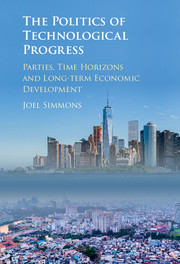Book contents
- Frontmatter
- Dedication
- Contents
- List of Figures
- List of Tables
- Acknowledgments
- 1 Introduction
- 2 A theory of political parties and technological progress
- 3 An empirical investigation of political parties and technological progress
- 4 Weak institutionalization and myopic policymaking
- 5 State failures, market failures, and technological progress
- 6 Conclusion
- A Appendix to Chapter 1
- B Appendix to Chapter 2
- C Appendix to Chapter 3
- References
- Index
1 - Introduction
Published online by Cambridge University Press: 13 July 2017
- Frontmatter
- Dedication
- Contents
- List of Figures
- List of Tables
- Acknowledgments
- 1 Introduction
- 2 A theory of political parties and technological progress
- 3 An empirical investigation of political parties and technological progress
- 4 Weak institutionalization and myopic policymaking
- 5 State failures, market failures, and technological progress
- 6 Conclusion
- A Appendix to Chapter 1
- B Appendix to Chapter 2
- C Appendix to Chapter 3
- References
- Index
Summary
From the 1960s until the end of the twentieth century, Singapore and Thailand were two of the world's unambiguous economic success stories. The statistics have been recounted often, but even so, they still manage to astound. Between its first full year of independence in 1966 and 2009, per capita GDP in Singapore increased an order of magnitude from about $5,000 per person (in real 2005 dollars) to just shy of $50,000. Annual income growth averaged about 6.5% until the Asian Financial Flu of 1997. Essentially, over the course of a generation, Singapore transformed itself from a basket case economy to a country whose wealth was on par with that of the United States. Thailand's trajectory was no less impressive. Between 1950 and 2009, per capita income increased over seven times from about $1,000 per person to just under $8,000.
Millions were lifted out of poverty in the two countries over the years. Yet as the century came to a close, the specter of diminishing returns loomed large over Singapore and Thailand, and prognosticators began to reach some rather dismal conclusions about the countries’ futures. It had become clear, many argued, that their tremendous growth rates originated from unsustainable levels of capital and labor mobilization, while technological progress, the key to persistent gains in per capita income, was virtually nonexistent (Collins and Bosworth, 1996; Young, 1995). The implication was as clear as it was bleak; the astounding gains in income and well-being these countries experienced in the past simply could not continue going forward. Paul Krugman's analysis of the Singaporean economy was typical:
Singapore's growth has been based largely on one-time changes in behavior that cannot be repeated. Over the past generation the percentage of people employed has almost doubled; it cannot double again. A half-educated work force has been replaced by one in which the bulk of workers has high school diplomas; it is unlikely that a generation from now most Singaporeans will have Ph.D.s. And an investment rate of 40% is amazingly high by any standard; a share of 70% would be ridiculous. So one can immediately conclude that Singapore is unlikely to achieve future growth rates comparable to those of the past (Krugman, 1994, p. 71).
- Type
- Chapter
- Information
- The Politics of Technological ProgressParties, Time Horizons and Long-term Economic Development, pp. 1 - 40Publisher: Cambridge University PressPrint publication year: 2016



